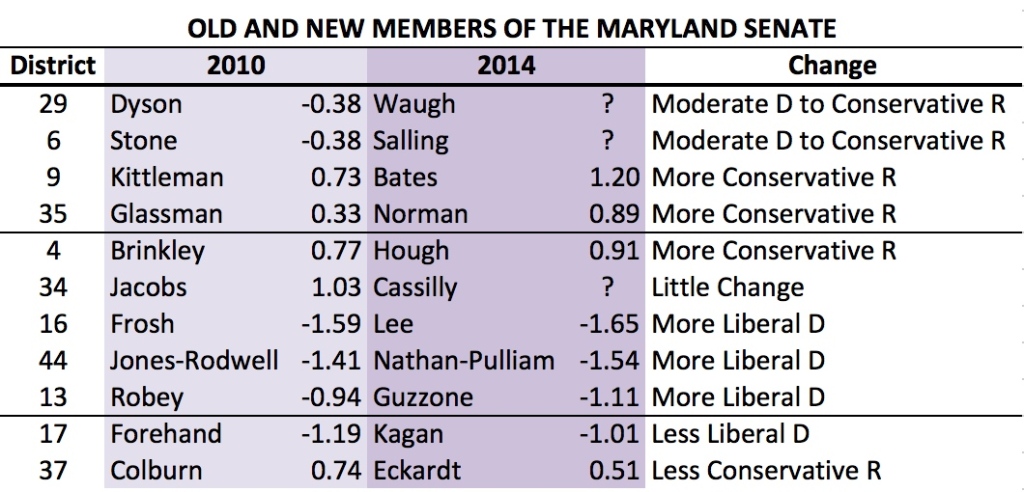Past posts have mentioned that the new Maryland General Assembly will be more polarized than the previous one. But what is the measurable impact of the election? Fortunately, since many new senators were formerly delegates, there are measures of their ideology in relation to other legislators.
Using the same dataset provided by Boris Shor and Nolan McCarty of state legislator ideology mentioned in previous posts, this post examines directly the ideology of incoming senators as compared to the people they are replacing. (The scale ranges from around -1.9 for the most liberal Democrat to 1.2 for the most conservative Republican with moderates closest to zero.)
In two cases, measures are not available but the impact is clear. Sens. Roy Dyson and Norm Stone were among the most very moderate members of the Democratic Caucus. They are being replaced by conservative Republicans. These changes will leave the Democrats more liberal and quite possibly also make the Republicans more conservative.
Two cases of Republicans being replaced by fellow Republicans will clearly make the GOP Caucus more conservative. Del. Gail Bates is more conservative than Alan Kittleman. Similarly, Del. Wayne Norman is also more conservative than Sen. Barry Glassman.
There are seven cases with less dramatic changes. Despite the fierce primary, Del. Michael Hough’s voting record has not been dramatically more conservative than Sen. Michael Brinkley. Theirs may be a difference more of style than of substance. But a more confrontational style likely exacerbates polarization.
In Howard County, Del. Guy Guzzone is a bit more liberal than outgoing Sen. Jim Robey. Del. Susan Lee is just a tad more liberal than AG-Elect Brian Frosh. Retiring Sen. Verna Jones-Rodwell has a somewhat less liberal voting record than Del. Shirley Nathan-Pulliam. The impact of the replacement of conservative Sen. Nancy Jacobs by Bob Casilly is less clear but it would be surprising if he turns out to be less conservative than Jacobs.
In two cases, changes may mildly reduce polarization. During her previous service in the House, Cheryl Kagan was a bit less liberal than outgoing Sen. Jennie Forehand. Similarly, Del. Addie Eckardt is a tad less conservative than defeated Sen. Richard Colburn. She is also viewed as a more thoughtful and productive member of the General Assembly than Colburn, who focused on scoring political points rather than shaping legislation.
The Overall Impact
Excluding the three seats won by people who have not served previously in the General Assembly, here are the calculations for the overall ideology of the Senate.
Median D: -1.107 (change of -0.005).
Mean D: -1.115 (change of -0.047).
Median R: 0.881 (change of 0.124).
Mean R: 0.883 (change of 0.062).
Increase in Polarization (Medians): 0.13 (7% increase).
Increase in Polarization (Means): 0.11 (6% increase).
Remember that these calculations underestimate increases in polarization because they exclude the two cases that will have the most dramatic impact–the replacement of Dyson and Stone–especially on the Democratic side as they were among the five most moderate Democrats in the Senate.



